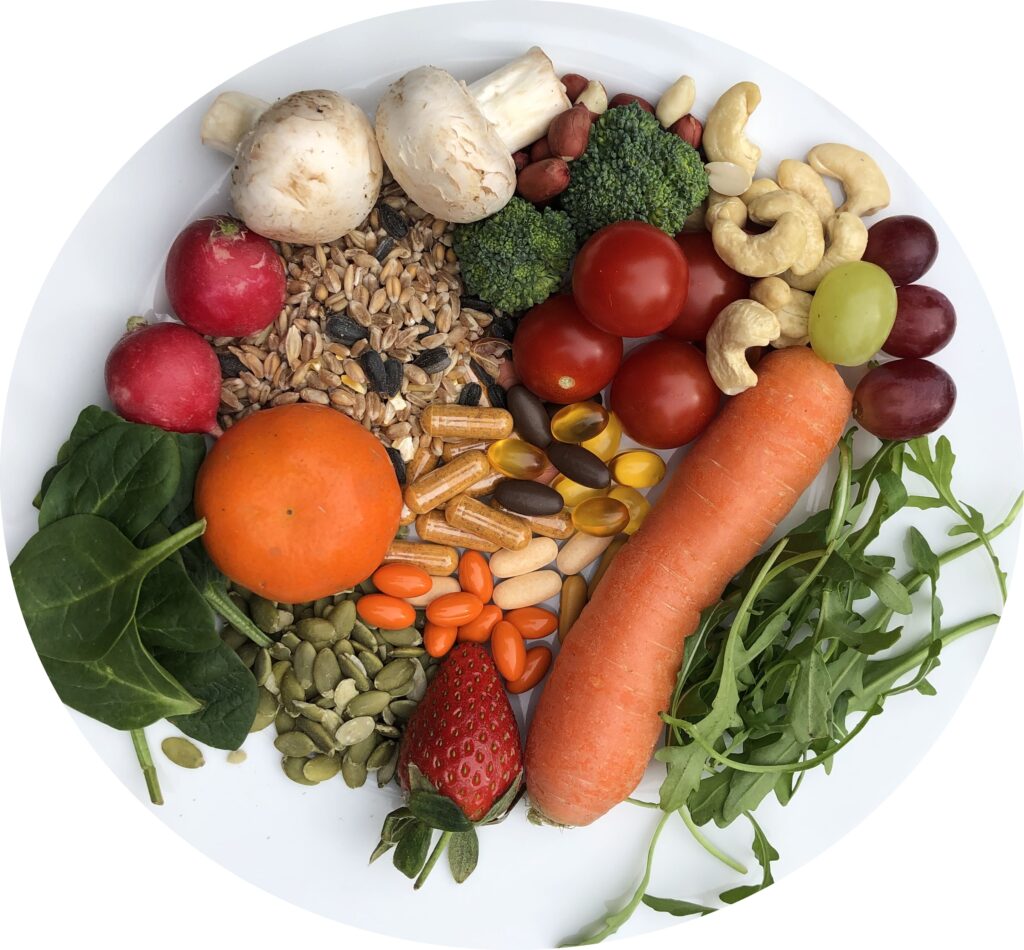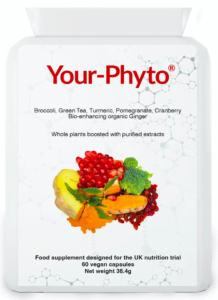 It’s really important to look after the trillions of healthy bacteria in our gut. If we take them for granted they will be replaced by pro-inflammatory “bad” bacteria which damage the lining of the gut, lower immunity and allow toxins to leak into our bodies and nutrients to leak out (read more).
It’s really important to look after the trillions of healthy bacteria in our gut. If we take them for granted they will be replaced by pro-inflammatory “bad” bacteria which damage the lining of the gut, lower immunity and allow toxins to leak into our bodies and nutrients to leak out (read more).
Poor gut health is linked to fatigue, lack of concentration, weight gain and increased risk of food intolerance, ulcers, inflammatory bowel disease, covid and long covid and in the long term dementia, cancer and heart disease (read more).
Dietary and lifestyle factors have a strong influence this delicate ecosystem particularly; eating probiotics rich fermented foods, exercise, excess meat and sugar, smoking, antibiotic intake or simply getting older (read more). The critical role phytochemical rich foods have in promoting a healthy gut is becoming increasingly apparent:
What are phytochemicals?
Phytochemicals give food its colour, taste and aroma so are rich in colourful fruits, vegetables, nuts, herbs and spices. As well as these amazing attributes they have enormous health benefits via their ability to:
- Reduce excess inflammation including amyloid in the brain
- Improve oxidative efficiency
- Slow the transport of sugar and improving insulin efficiency
- Help DNA repair and support expression of our healthy genes
- Counterbalance dietary and environmental toxins and carcinogens
- Protect the cartilage in joints
It is not a surprise then that people who have diets rich in phytochemicals have a lower risk of cancer, arthritis, obesity, diabetes, dementia and perform better at sport and work. On top of these incredible benefits, an increasing body of evidence is now revealing their vital role in improving the gut health by supporting the growth of healthy bacteria and impeding the formation of unhealthy bacteria. This is via a number of mechanisms:
How Phytochemicals support a healthy gut:
- Lignans found in beans and nuts, ellagitannin found in pomegranate and curcumin found in turmeric are broken down into butyrate and other small molecules which help feed both the health bacteria and the cells lining the gut, improving gut wall integrity [Carlson, Arcanjo, Kol,
- Mushroom, have anti-biotic properties which directly kill unhealthy bacteria. These foods also protect bacteria from the enzymes in the saliva and stomach, enabling the formation of healthy colonies in the small bowel and colon [Alves-Santos].
- Citrus fruits, rich in bioflavonoids and chamomile rich in Apigenin both directly reduce gut inflammation creating a more favourable growing environment for the health bacteria [Sirvastava, Matic].
- Resveratrol found in grapes and polygonum cuspidatum root, enhances the formation of a protective biofilm over healthy bacteria such as Lactobacillus, facilitating healthy colony formation [Al Azzaz].
- Pomegranate and citrus bioflavonoid plus vitamin C help convert ingested nitrates into healthy nitric oxide (NO) preventing the formation of carcinogens such as nitrosamines [Davinilli, Peron].
How to improve phytochemical intake
 Asian and Mediterranean diets are typically abundant in phytochemical-rich vegetables, salads, herbs, spices, teas, nuts, fruits, seeds and legumes. Typical western diets, on the other hand, are deficient in them, meaning we need to eat a lot more of them with every meal of the day. In terms of gut health they can be categorisied as soluble fermentable fibres or polyphenol prebiotics:
Asian and Mediterranean diets are typically abundant in phytochemical-rich vegetables, salads, herbs, spices, teas, nuts, fruits, seeds and legumes. Typical western diets, on the other hand, are deficient in them, meaning we need to eat a lot more of them with every meal of the day. In terms of gut health they can be categorisied as soluble fermentable fibres or polyphenol prebiotics:
Soluble fermentable fibres include Inulin; Starches such as sucoligosaccharides and fructooligosaccharide found in and other Polysaccharide beta-glucans. These are mainly found in:
- Chicory, leeks and asparagus, onions garlic
- Onions, asparagus, wheat, tomatoes beans and grains
- Fruits, vegetables and mushrooms
- Guar gum and psyllium.
2. Polyphenol prebiotics include plant lignans ; ellagic acid into ellagitannin
- Nuts, Bananas, citrus fruit such as pears, apples, cranberries, pomegranate
- Beans such as chickpeas, peas, kidney beans
- Vegetables and roots, broccoli, asparagus, chicory root and artichoke,
- Grains and seeds such as barley, oats and linseeds
- Resveratrol in grapes and red wine
- Spices such as garlic, turmeric and chile
- Tea and unsweetened chocolate
 Phytochemical rich supplements
Phytochemical rich supplements
In the busy world we live in, it’s is often difficult to prepare foods with enough phytochemicals on a daily basis. A well made supplement, is a convenient way to increase intake and spread intake across the day. Nutritional supplements can also contain foods which are not commonly available or not often eaten in Western diets. The problem is, the quality of over the counter supplements can be very variable and most have not been evaluated in robust medical trials.
The notable exception is YourPhyto which was designed to provide a convenient, safe and evidence based way of increasing healthy plant phytochemical from the start of every day.
It is the only supplement which harnesses the benefits of whole foods as well as targeted extracts from the same species. This ensures both a broad range of phytochemicals from the whole plant as well as a boosted, measurable intake of specific candidate phytochemicals which are most likely to confer the health benefits.
It was developed by the scientific committee of the latest national intervention study following scrutiny of the most robust clinical studies both from the UK and internationally. Because it was made for a nationally approved clinical study it has a level of quality assurance unprecedented in the supplement world: Yourphyto contains only pure plants:
- Broccoli: Whole dried florets
- Turmeric: Whole dried Turmeric
- Turmeric extract: providing extra pure Curcuminoids
- Pomegranate: Whole dried skin, pulp and seeds
- Pomegranate extract: providing more phytochemical especially Ellagic Acid
- Green tea extract: providing polyphenols including EGCG
- Cranberry purified extract: providing polyphenols including quercetin and flavonols
- Ginger: Whole organic bio-enhancing root enhancing absorption and bioavailability
References
Carlson JL, Erickson JM, Lloyd BB, Slavin JL (2018) Health Effects and Sources of Prebiotic Dietary Fiber. Curr Dev Nutr 2: nzy005.
Alves-Santos AM, Sugizaki CSA, Lima GC, Naves MMV. Prebiotic effect of dietary polyphenols: A systematic review. Journal of Functional Foods. 2020; 74 (1): 1-34. https://www.sciencedirect.com/science/article/pii/S1756464620303935.
Al Azzaz J, et al. Resveratrol Favors Adhesion and Biofilm Formation of Lacticaseibacillus paracasei subsp. paracasei Strain ATCC334. International Journal of Molecular Sciences. 2020; 21 (15): 5423-5446. https://www.ncbi.nlm.nih.gov/pmc/articles/PMC7432909/.
Morrison D et al. Formation of short chain fatty acids by the gut microbiota and their impact on human metabolism. Gut Microbes. 2016; 7 (3): 189. https://www.ncbi.nlm.nih.gov/pmc/articles/PMC4939913/
Koh A, et al. From dietary fibre to host physiology: short-chain fatty acids as key bacterial metabolites. Cell. 2016; 165 (6): 1332-1345. https://www.sciencedirect.com/science/article/pii/S009286741630592X.
Arcanjo N et al. Resveratrol protects Lactobacillus reuteri against H2O2- induced oxidative stress and stimulates antioxidant defenses through upregulation of the dhaT gene. Free Radical Biology and Medicine. 2019; 135 (1): 38 https://www.sciencedirect.com/science/article/pii/S0891584918321646.
Gross G, et al. In vitro bioconversion of polyphenols from black tea and red wine/grape juice by human intestinal microbiota displays strong inter-individual variability. Journal of Agricultural and Food Chemistry. 2010; 58 (18): 10236-10246. https://pubs.acs.org/doi/10.1021/jf101475m.
Matić I,Savikin K, Zdunic G et Chamomile and Marigold Tea: Chemical Characterization and Evaluation of Anticancer Activity Phytotherapy Research Volume 27 (6), 852-58https://doi.org/10.1002/ptr.4807Phyt
